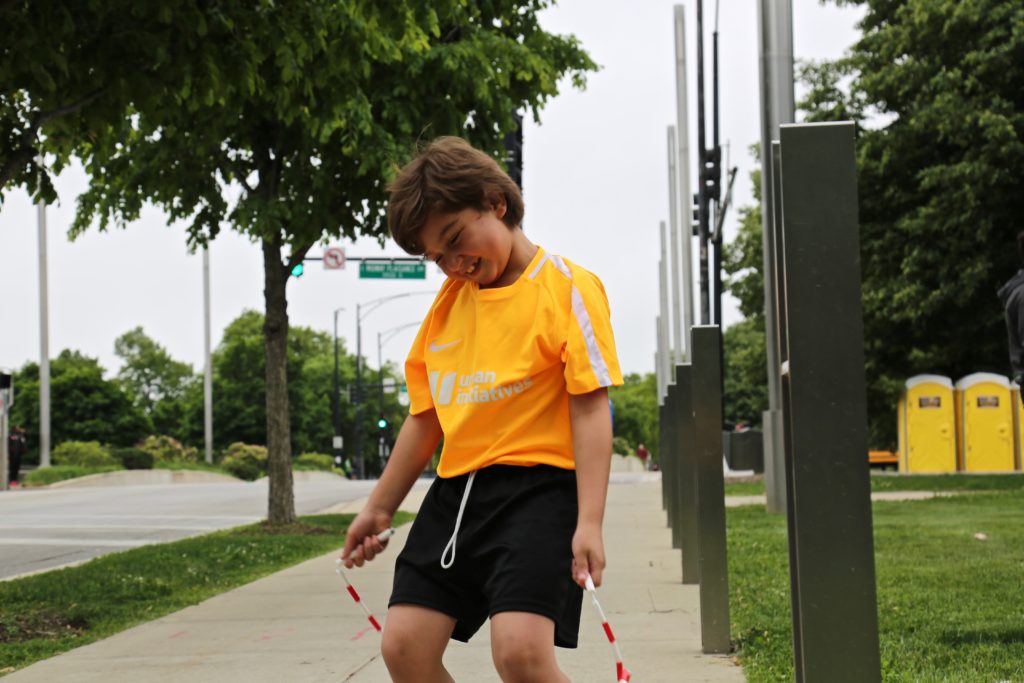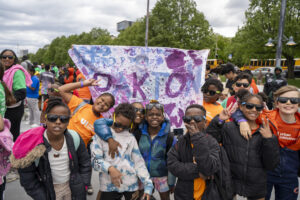Urban Initiatives is excited to announce that our 2017-2018 data and evaluation results are complete and our programs have once again showed strong results in physical activity, academic success, and social emotional learning. Urban Initiatives is committed to being a proven organization that continually evaluates our programs to determine success and to make curriculum and implementation changes in order to best serve our students, families, and schools.
Work to Play
The Urban Initiatives Work to Play program provides kindergarten through fourth grade students the opportunity to play on their schools’ soccer team, enables our participants to be physically active, embeds opportunities for social emotional learning, and incentivizes academic achievement. Our Research and Evaluation team measures this program’s impact through pre and post test surveys which are administered to our participants, coaches, and families. These surveys allow us to gauge students’ and families’ engagement in healthy living practices and provide coaches an opportunity to assess participants’ social emotional learning and growth over the course of the program year. Additionally, students’ height and weight are measured at the beginning and the end of the program year in order to provide our evaluation team with a picture of changing body mass index, an indicator for potential future weight and health-related issues, in comparison to their peers.
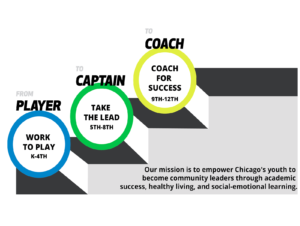
Our Work to Play program saw continued success in physical activity in the 2017-2018 school year. For the second year in a row, Urban Initiatives parents reported significant increases in their child’s physical activity. By the end of the program year, the number of parents who reported their child was “mostly” or “always” physically active for one hour each day (as recommended by national guidelines) increased by 71%, from less than half of parents at the beginning of the year (46%) to 78% of parents at the end of the year. This finding was statistically significant at a 95% confidence level. Year over year, the Work to Play program shows positive trends for physical activity and physical fitness in general.
In the Work to Play program, it was particularly exciting to see increased parent engagement. This year our staff worked to create spaces that encouraged parent engagement through parent meetings and we saw these efforts come to fruition in our post-test surveys. By the end of the program year, 86% of parents reported attending at least one Urban Initiatives event, such as a game day with other schools or the end-of-year Work to Play Cup soccer tournament. In addition to attending events, we saw increases in parents engaging with their child about academics or health behaviors outside of program settings. Of parents who didn’t already talk to their child about schoolwork every day, nearly half (48%) more regularly engaged with their child about school after participating in the program. In addition, we saw statistically significant increases in the number of parents who reported more frequently encouraging their child to engage in healthy behaviors, such as eating fruits and vegetables or decreasing time spent in front of a TV or computer, by the end of the program year.
Take the Lead
Our Take the Lead program is the second step in Urban Initiatives’ continuum of programming and serves students in 5th–8th grade. Take the Lead focuses on leadership development, high school readiness, and conflict transformation through continued social emotional learning, recognizing that conflict is inevitable and that, when addressed effectively, can lead to peaceful, positive change.Through this program, participants act as Team Captains for students in the Work to Play program in order to pay it forward to students younger than themselves and develop key leadership skills. We evaluate our Take the Lead program through pre- and post-test surveys, and CPS administrative data such as grades and attendance.
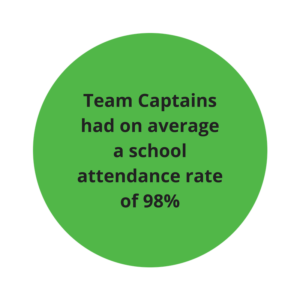
During these middle grades, according to the UChicago Consortium on School Research, school attendance and academic performance are incredibly important to determine success in high school. Urban Initiatives is proud to report that 78% of Take the Lead students with an action plan — which is given when a participant’s GPA falls below a 2.5- improved their GPA the following quarter. Additionally, Team Captains had on average a school attendance rate of 98%. With grades and school attendance playing such an important role in determining high school success, we are excited to see our Team Captains working hard and persevering in school.
Continuing to see academic success among our Take the Lead participants in encouraging. While students may self-select into this program because they want to be a leader and a team captain, it is important to support these high-achieving students through individualized support and small-group mentorship. These students crave opportunities for leadership and demonstrate drive and goal setting, and it is important to empower them with the strategies and supports needed for academic success so that they can carry this ambition into their high school years.
Coach for Success
Our Coach for Success program is the final step in our continuum of programming and serves high school students in grades 9–12. This program focuses on college and career readiness and every participant is paired with an adult mentor who helps to provide guidance and serve as a resource while reinforcing the program curriculum’s focus on life skill building. This program is evaluated through an end of year focus group with program participants.
One of the key findings from this year’s focus group was that participants don’t see our program as impacting only a handful of key outcome areas, but rather appreciate that the program and Urban Initiatives in its entirety acts as a critical support system. They feel that they can pop into the UI office at any time and ask staff- regardless of their department or role — for advice and help. Access to adult resources in combination with development of life skills (such as communication and networking skills) is the most valuable aspect of this program in our participants’ eyes, and this has been accomplished through mentorship and staff support.
Play with Potential
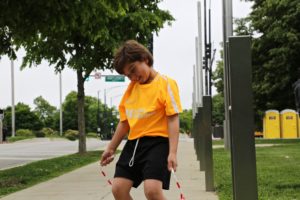
Play with Potential is our recess program that fosters intentional, inclusive play spaces in schools across Chicago in order to improve the culture and climate of an entire school community. Our Play with Potential program is observed by UI’s research and evaluation team and principals and teachers complete surveys to provide feedback on the program and assess students’ experience at recess and subsequent behavior in the classroom.
This year’s evaluation results showed positive results in social emotional learning, an encouraging finding given our Play with Potential program team’s increased focus in this area. Principals at Play with Potential schools were significantly more likely to report positive interactions between recess staff and students, and that recess staff intentionally engaged in opportunities for social emotional learning with students.Additionally, Play with Potential recess staff more frequently created age-appropriate activities for students which led to more student engagement in activities. Overall, 72% of K-8th grade students observed at Play with Potential recess engaged in moderate-vigorous physical activity at recess. Play with Potential recess programming sets itself apart by providing both opportunities for social emotional learning and physical activity in highly intentional and impactful recess sessions.

